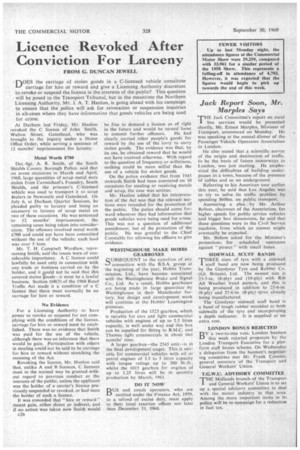Licence Revoked After Conviction For Larceny
Page 62

If you've noticed an error in this article please click here to report it so we can fix it.
FROM G. DUNCAN JEWELL -DOES the carriage of stolen goods in a C-licensed vehicle constitute carriage for hire or reward and give a Licensing Authority discretion to revoke or suspend the licence in the interests of the public? This question will be posed to the Transport Tribunal, but in the meantime the Northern Licensing Authority, Mr. 1. A. T. Hanlon, is going ahead with his campaign to ensure that the police will ask for revocation or suspension inquiries in allAcases where they have information that goods vehicles are being used for crime.
At Durham last Friday, Mr. Hanlon revoked the C licence of John Smith. Walton Street, Gateshead, who was brought to the inquiry under a Home Office Order, while serving a sentence of 12 months' imprisonment for larceny.
Metal Worth MO
Det.-Sgt. A. R. Smith, of the South Shields County Borough Police, said that on seven occasions in March and April, 1960, large quantities of scrap metal were stolen from Carmichael's Foundry, South Shields, and the prisoner's C-licensed vehicle was used to transport it to scrap lealers in Newcastle and Gateshead. On July 6, at Durham Quarter Sessions, he pleaded guilty to larceny and being an accessory to larceny of scrap metal on two of these occasions. He was sentenced to 12 months' .imprisonment, the remaining cases being taken into consideration. The offences involved metal worth £700 and could not have been committed without the use of the vehicle: each load was over 5 tons.
Mr. T. H. Campbell Wardlaw, representing Smith, said the issues were of considerable importance. A C licence could lawfully be used only in connection with any trade or business carried on by the holder, and it could not be said that this covered stolen goods—it must be a lawful business. Section 168(3) of the 1960 Road Traffic Act made it a condition of a C licence that there must normally be no carriage for hire or reward.
No Evidence For a Licensing Authority to have power to revoke or suspend for not complying with the conditions of the licence, carriage for hire or reward must be established. There was no evidence that Smith was paid for the use of the vehicle, although there was an inference that there would be gain. Participation with others in stealing could not be said to be carriage for hire or reward without stretching the meaning of the Act.
Revoking the licence, Mr. Hanlon said that, unlike A and B licences, C licences must in the normal way he granted‘ without regard to previous conduct or the interests of the public, unless the applicant was the holder of acarrier's licence previously suspended or revoked, or had been the holder of such a licence.
It was conceded that "hire or reward" Meant gain, either direct orindirect, and if no action was taken now Smith would c26 be free to demand a licence as of right in the future and would be turned loose to commit further offences. He had clearly carried other people's goods for reward by the use of the lorry to carry stolen goods. The evidence was that, by its use, he obtained reward that he would not have received otherwise. With regard to the question of frequency or wilfulness, nothing could be more wilful than the use of a vehicle for stolen goods.
• On the police evidence that from 1945 onwards Smith had been convicted on 10 occasions for stealing or receiving metals and scrap, the case was serious.
Mr. Hanlon added that his interpretation of the Act was that the relevant sections were intended for the protection of the public. The police should come for ward whenever they bad information that goods vehicles were being used for crime. This was not a question of additional punishment, but of the protection of the public. He was grateful to the Chief Constable for allowing his officers to give evidence.
WESTINGHOUSE MAKE HOBBS GEARBOXES
SUBSEQUFNT to the cessation of any connection with the B.S.A. group at the beginning of the year, Hobbs Transmission, Ltd., have become associated with the Westinghouse Brake and Signal Co., Ltd. As a result, Hobbs gearboxes are being made in large quantities by Westinghouse in their Manchester factory, but design and development, work will continue at the Hobbs' Leamington premises.
Production of the 1523 gearbox, which is suitable for cars and light commercial vehicles with engines of up to 2.5 litres capacity, is well under way and this box can be supplied for fitting to B.M.C. and Thames light commercials hi about two months' time.
A larger gearbox—the 2545 unit—is in the final development stages. This is suitable for commercial vehicles with oil or petrol engines of 3.5 to 5 litres c3pacity with torque ratings up to 300 lb.-ft., whilst the 1015 gearbox for engines of up to 1.25 litres will be in quantity production by March, 1961.
DO IT NOW
BUS and coach operators, who are entitled under the Finance Act, 1959, to a refund of excise duty, must apply to their local taxation offices not later than December 31, 1960.
























































































































































































